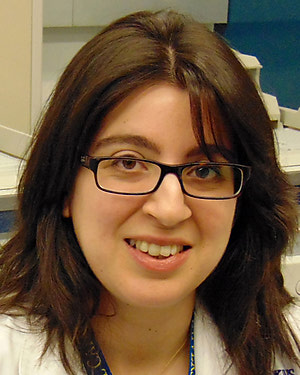Research Lab Results
-
GI Biomarkers Laboratory
The GI Biomarkers Laboratory studies gastrointestinal cancer and pre-cancer biogenesis and biomarkers. The lab is led by Dr. Stephen Meltzer, who is known for his research in the molecular pathobiology of gastrointestinal malignancy and premalignancy. Research in the lab has led to several groundbreaking genomic, epigenomic and bioinformatic studies of esophageal and colonic neoplasms, shifting the gastrointestinal research paradaigm toward genome-wide approaches.
-
Zhu Lab
The Zhu lab is focused on characterizing the activities of large collection of proteins, building signaling networks for better understanding the mechanisms of biological processes, and identifying biomarkers in human diseases and cancers. More specifically, our group is interested in analyzing protein posttranslational modifications, and identifying important components involved in transcription networks and host-pathogen interactions on the proteomics level, and biomarkers in human IBD diseases.
-
Eberhart, Rodriguez and Raabe Lab
Utilizing a combination of tissue-based, cell-based, and molecular approaches, our research goals focus on abnormal telomere biology as it relates to cancer initiation and tumor progression, with a particular interest in the Alternative Lengthening of Telomeres (ALT) phenotype. In addition, our laboratories focus on cancer biomarker discovery and validation with the ultimate aim to utilize these novel tissue-based biomarkers to improve individualized prevention, detection, and treatment strategies. -
Kenneth J. Pienta Lab
The Kenneth J. Pienta laboratory has championed the concept that cancer tumorigenesis and metastasis can best be understood utilizing the principles of Ecology. As a result, the Pienta laboratory is working to develop new treatments for cancer utilizing network disruption. -
Heng Zhu Lab
The Zhu lab is focused on characterizing the activities of large collection of proteins, building signaling networks for better understanding the mechanisms of biological processes, and identifying biomarkers in human diseases and cancers. More specifically, our group is interested in analyzing protein posttranslational modifications, and identifying important components involved in transcription networks and host-pathogen interactions on the proteomics level, and biomarkers in human IBD diseases. -
Molecular Oncology Laboratory
Our Molecular Oncology lab seeks to understand the genomic wiring of response and resistance to immunotherapy through integrative genomic, transcriptomic, single-cell and liquid biopsy analyses of tumor and immune evolution. Through comprehensive exome-wide sequence and genome-wide structural genomic analyses we have discovered that tumor cells evade immune surveillance by elimination of immunogenic mutations and associated neoantigens through chromosomal deletions. Additionally, we have developed non-invasive molecular platforms that incorporate ultra-sensitive measurements of circulating cell-free tumor DNA (ctDNA) to assess clonal dynamics during immunotherapy. These approaches have revealed distinct dynamic ctDNA and T cell repertoire patterns of clinical response and resistance that are superior to radiographic response assessments. Our work has provided the foundation for a molecular response-adaptive clinical trial, where therapeutic decisions are made not based on imaging but based on molecular responses derived from liquid biopsies. Overall, our group focuses on studying the temporal and spatial order of the metastatic and immune cascade under the selective pressure of immune checkpoint blockade with the ultimate goal to translate this knowledge into “next-generation” clinical trials and change the way oncologists select patients for immunotherapy.
-
The Pathak Lab
The Pathak lab is within the Division of Cancer Imaging Research in the Department of Radiology and Radiological Science. We develop novel imaging methods, computational models and visualization tools to ‘make visible’ critical aspects of cancer, stroke and neurobiology. Our research broadly encompasses the following areas: Functional and Molecular Imaging; Clinical Biomarker Development; Image-based Systems Biology and Visualization and Computational Tools. We are dedicated to mentoring the next generation of imagers, biomedical engineers and visualizers. Additional information can be found at www.pathaklab.org or by emailing Dr. Pathak. -
Srinivasan Yegnasubramanian Lab
Dr. Yegnasubramanian directs a Laboratory of Cancer Molecular Genetics and Epigenetics at the Sidney Kimmel Comprehensive Cancer Center (SKCCC), and is also the Director of the SKCCC Next Generation Sequencing Center. Our lab research is focused on understanding the complex interplay between genetic and epigenetic alterations in carcinogenesis and disease progression, and to exploit this understanding in developing novel biomarkers for diagnosis and risk stratification as well as in identifying targets for therapeutic intervention.




